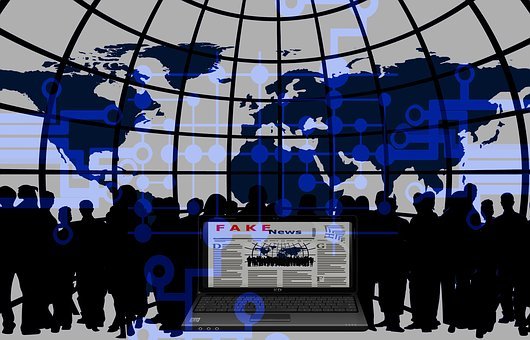Hoax and Credibility of Election Organizers in Indonesia |
By @ayijufridar
Spreading hoaxes or hoaks has always been a part of modern elections in Indonesia, especially since the presence of the internet and social media. The public gets space to participate in broadcasting information, not limited to consuming information from the mass media as in the past. This condition provides broad opportunities for balance as well as misinformation, even leading to the spread of defamation.
Lying news attacks through social media began to be more systematic and massive in the 2019 elections, not as intense as in the 2004, 2009, or 2014 elections. In the last election - especially in the presidential election - hoax storms only hit election participants. In contrast to the 2019 election stage which also targets election organizers, especially the General Election Commission (KPU). Such was the case with various hoaks that swept in and out, to the point that the KPU indicated that there was an effort to build public distrust of the election results. Suggestions for pairs of presidential and vice presidential candidates to resign before the vote also suggest distrust of the neutrality and integrity of the organizer, as well as reflecting the mentality of losing before fighting.
Fake news spreaders do not seem to care about logic flaws in the material on the cases they have viraled, for example in the case of seven-container ballots that have been punched. The news circulated too fast, before the two camps agreed on a photo of the candidate pair to be used in the ballot later. The news that can be confirmed with the stages of the election and legislation, will be easily broken. Spreaders may not care about weak logic because their target is to make noise and make the public doubt the credibility of the organizers.
Free advertising
Some hoaxes that have become viral all this time always start with social media which is then captured by the mainstream mass media. When the issue moves from the social media space to the mass media space, an issue will draw greater attention. The level of public trust also increased, especially if the news contained only "retaliation" between one faction and another plus a bit of normative information from the police who processed the case.
In this condition the intelligence of the mass media is needed in managing the issue and not being trapped in the issue settings of the election participants, both legislative and presidential. Every election participant has a campaign team that is good at utilizing various issues that are not just attacking the opposing camps, as well as to get free advertising news. Political promises and issues with low magnitude will be difficult to get a place in the mass media. One of the ways to steal the attention of the mass media is with "wow" and unique issues.
From fake news to education
No matter how troublesome the storm was for organizers, there was still a positive side that could be exploited. The way the organizer responds to the issue will be an educational venue for the community when it is delivered at the right time and place. Organizers must have to build strong arguments based on rules and facts that are indisputable. The KPU should not answer, "how could there be a ballot circulating while the ballots just haven't been printed" that sounded innocent as a KPU commissioner once conveyed at a television station, as if printing fake ballots had to wait for permission from the organizer.
On the other hand, the hoax storm will encourage organizers (KPU, Bawaslu, and the Election Organizer Honorary Board, DKPP) to be more obedient to the rules, carrying out all stages honestly from the mind. There is no room to take sides, act unfairly, let alone cheat amid the eyes of law enforcement, mass media, election participants, observers, and of course voters as the owner of voting rights. Compliance with Law Number 7 of 2017 Concerning Elections, Election Organizer Code of Ethics, and implementing regulations, is a necessity in the midst of various efforts that undermine credibility and delegitimize organizers.
Each commissioner must avoid contradictory explanations of various issues. Different answers actually add to the public increasingly distrust as in the case of whether or not the candidate pair of president and vice president change their vision and mission. One KPU commissioner said he could, another said he could not, and the third said that it was justified within a certain deadline. If the accuracy of mass media information is correct, then three KPU commissioners are seen not to have one word in the matter of revising the vision and mission of the president and vice president.
Antihoaks strategy
Systematic and strategic socialization should be the next KPU's attention, especially with the stages of the vision and mission, the logical distribution, and the campaign of public meetings with greater mass involvement. The storm hoaks that have hit the building of public trust, do not be shaken because the organizers are less intelligent in managing information than the hoax spreaders. More intensive and focused socialization must continue to be done through various media. Lying news will continue to appear even after the election is over, because it is outside the authority of the organizer. The only side that organizers can fix is themselves by preparing an antihoax strategy, without having to neglect the main task of carrying out and overseeing each stage.
Past experience proves that no matter how hard the organizers enforce the rules and code of ethics, but alone cannot build the confidence of the losing election participants. However, if the organizers continue to consistently uphold the rules and code of ethics, the seeds of mistrust that remain will disappear in time, so that the dream of building an EMB with integrity, professionalism, independence, transparency, and accountability is no longer just an empty text that is poor in implementation.[]







Hello @ayijufridar, Thank you for contributing to RealityHubs.
This is a nice post with an interesting subject matter.
The issue of fake news and hoaxes is a global matter and recently it has been utilized greatly by various parties to strengthen their positions and weaken the positions of their opponents.
I'm not surprised to see that disinformation is being used in Indonesia as a tool for vanquishing enemies especially in the area of politics as it is also being used the same way over here in Nigeria even when there are no elections.
Recently, a human right activist was arrested by our government for trying to spark a revolution and some hours later I saw a post on social media supposedly made by a past police IG about how he had apprehended the activist for a sexual offence and how he jumped bail.
The truth to the statement is something I cannot establish though I'm already suspecting that it's fake news.
It'd be nice if measures were to be taken to counter the issue of spreading disinformation.
I love this topic and the post was great to read though some parts of it were hard to understand.
It would have been nicer if you had given more than one instance of hoax in your country.
Overall, you did a great job and we are looking forward to future contributions from you.
Do you have any questions? Chat with us on Discord
RealityHubs Moderator
I think fake news is not only used in the political celebration of developing countries like Indonesia. Super power countries like the United States also use fake news to win general elections. in Indonesia, fake news is used massively in the 2019 presidential election. Supporters of certain candidates attack opponents with various false information about religious issues, corruption, and so on. One example, uses the issue of the candidate pair's religion in opposition to the dominant voter religion.
In Indonesia, there is research about cities with the highest fake news and voter tendencies. Cases in Indonesia might also apply in other parts of Indonesia.
On the other hand, there are also movements from certain communities to fight the spread of fake news in various ways, including by using social media. That is, the younger generation increasingly cares about the truth of the information they receive. According to research in Indonesia, adults are more prone to hoax attacks than young children.
I am very happy that your response exceeded my expectations. I am a good start, despite my shortcomings in English. Iam so Sorry for the that. Thank you very much @gotgame. Let's join with RealityHubs on dircord.
Hello there. I am glad that you are having a good conversation. That's said, I strongly suggest that you stop self-voting your comments.